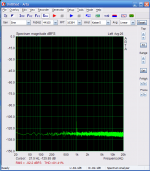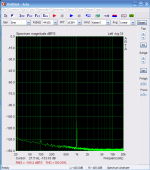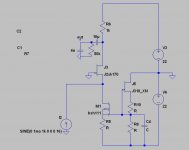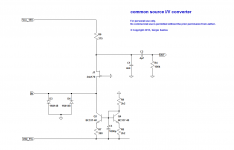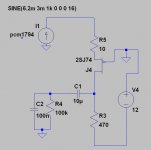Sergio, this is consistent with measurements I have done in the past.
Would be curious to know what happens to SFDR at 96K and 192K above 20kHz if you can and let us know.
Would be curious to know what happens to SFDR at 96K and 192K above 20kHz if you can and let us know.
Here is the difference between 16bit and 24bit .
the first picture is from a signal of -110db when the DAC is at 16bit mode, the noise floor is at -126bits , this is very good and there are lots of DACs of 24bits that can not meet this noise specifications.
The second picture is from a signal of -110db when the DAC is at 24bit mode, the noise floor is lower than the capacity of the ADC.
Even failing to listening the -110db 1Khz signal , surprisingly the noise floor was audible in the 16bits mode at the maximum volume on headphones, but at normal listening volume the noise floor was inaudible.
At 24bits even at the maximum volume the noise floor was completly inaudible.
I think that the old 16bits format do perform very well and surpass the human hearing threshold. But for studio work 24bits is mandatory.
the first picture is from a signal of -110db when the DAC is at 16bit mode, the noise floor is at -126bits , this is very good and there are lots of DACs of 24bits that can not meet this noise specifications.
The second picture is from a signal of -110db when the DAC is at 24bit mode, the noise floor is lower than the capacity of the ADC.
Even failing to listening the -110db 1Khz signal , surprisingly the noise floor was audible in the 16bits mode at the maximum volume on headphones, but at normal listening volume the noise floor was inaudible.
At 24bits even at the maximum volume the noise floor was completly inaudible.
I think that the old 16bits format do perform very well and surpass the human hearing threshold. But for studio work 24bits is mandatory.
Attachments
Kevin, I took this measurements with the ADC at 44.1Khz as the ADC also has more distortion at high sampling hates , but will do the same tests with the ADC at 192K , but dont promisse that will do that today. 🙂
does linearity at the dac output matters? will the dac current output have added distortion?
for instance, i want to build a d1 style i/v(maybe just a jfet with ccs instead of a resistance sinking the current) that has low input impedance but that is not as linear as a simple resistance.
for instance, i want to build a d1 style i/v(maybe just a jfet with ccs instead of a resistance sinking the current) that has low input impedance but that is not as linear as a simple resistance.
Last edited:
🙂in case it s not clear,my question is
does the dac chip outputs more distortion if the load seen by this chip is not a linear resistive 25 ohms but an active 25 ohms with non-linearity.
if so, is it a concern?
does the dac chip outputs more distortion if the load seen by this chip is not a linear resistive 25 ohms but an active 25 ohms with non-linearity.
if so, is it a concern?
The pcm1794 have a high output impedance, you will be fine as long you use jfet with relative high Forward transfer admittance, like the 2sk170 or bf862, On semi also have good jfet for this. The majority of distortion will be generated by the jfet not by the dac chip, If you post a schematic I could help you better.
i wanted to build something like this...
no exact values for parts but that is more or less what i had in mind...
i thought that a sufficiently high impedant ccs would null the jfet distortion...?
no exact values for parts but that is more or less what i had in mind...
i thought that a sufficiently high impedant ccs would null the jfet distortion...?
Attachments
Last edited:
I have design and build a similar IV. And I liked very much, here it is for reference.
The output voltage is 1 Vrms , the distortion is low and mainly 2º Harmonic.
The power source is very important in this design, and if not design correctly will increase distortion and noise.
😎
The output voltage is 1 Vrms , the distortion is low and mainly 2º Harmonic.
The power source is very important in this design, and if not design correctly will increase distortion and noise.
😎
Attachments
yes power line is critical...no psrr.
i actually built one once like this with a zvn4424 at 100mA as active part and with suboptimal ccs and i too liked the sound very much . So i want to play with this design just to see were it can get me...
this in balanced operation must be really divine...
so...what is your little favorite now?🙂
i actually built one once like this with a zvn4424 at 100mA as active part and with suboptimal ccs and i too liked the sound very much . So i want to play with this design just to see were it can get me...
this in balanced operation must be really divine...
I have design and build a similar IV. And I liked very much
😎
so...what is your little favorite now?🙂
Yes, you can do it like that.
R5 is not needed, there is no problem if there is a small positive D.C. voltage in the output of the DAC, the problem is negative voltage (less than -0.4V ), the Dac uses internal protection diodes at the output connected to the supply pins, this diodes start to conduct at 0.4v and fail at 10mA.
R5 is not needed, there is no problem if there is a small positive D.C. voltage in the output of the DAC, the problem is negative voltage (less than -0.4V ), the Dac uses internal protection diodes at the output connected to the supply pins, this diodes start to conduct at 0.4v and fail at 10mA.
cool....so a wide range of idss can be use for j74...
i was also wondering if since the output impedance of pcm1794 is high, then voltage noise at the dac is a non issue, so that using a mosfet is not really noisier in the end...
...unless shot noise is more dominant...
i m not sure if i understand transistor noise but i m currently at it...
anyway...i will probably just try and listen to different devices.
i was also wondering if since the output impedance of pcm1794 is high, then voltage noise at the dac is a non issue, so that using a mosfet is not really noisier in the end...
...unless shot noise is more dominant...
i m not sure if i understand transistor noise but i m currently at it...
anyway...i will probably just try and listen to different devices.
i plan to play with pnp,npn,mosfet,jfet, bias,ccs,etc....maybe even put a bjt there....
from previous experience with sound from pcm1794 and d1 style i/v....i think it s worth trying different variations because i liked the signature...
for sure i ll let you guys know...
have you compared your regulator to likes of salas?
i tried different topologies and salas regs were always the best to me...
whenever i can, i also use unregulated, filtered or not, as i find them to sound more natural.
mosfet cap multiplier with reference is also transparent i find..
from previous experience with sound from pcm1794 and d1 style i/v....i think it s worth trying different variations because i liked the signature...
for sure i ll let you guys know...
have you compared your regulator to likes of salas?
i tried different topologies and salas regs were always the best to me...
whenever i can, i also use unregulated, filtered or not, as i find them to sound more natural.
mosfet cap multiplier with reference is also transparent i find..
Last edited:
In this particular application the linearity of the power supply is very important if you use cap multiplier the distortion will be very high, use a large capacitor (I use 10000uF ) to ground ,like in the picture (c1) . If you like the salas reg use it .
Normally my designs have good PSRR , so the PS is not a big issue.
The I/V converters that I use are based on this topology :
http://www.diyaudio.com/forums/digital-source/217459-dac-i-v-convertion-very-low-distortion.html
when I started that thread I did not have much experience with open loop designs or I/V converters for DAC , I have learn a lot since then 🙂
Normally my designs have good PSRR , so the PS is not a big issue.
The I/V converters that I use are based on this topology :
http://www.diyaudio.com/forums/digital-source/217459-dac-i-v-convertion-very-low-distortion.html
when I started that thread I did not have much experience with open loop designs or I/V converters for DAC , I have learn a lot since then 🙂
Attachments
how to collect DAC pkm1794? Available differential operational amplifiers opa1632 8, 4 DAC 1794 and opo627 8! necessary to organize third-order Bessel lowpass filter with an output of 4 volts RMS! will acquire all the necessary detail, or part of it is already there !! tell good people to begin
I enclose a photo card
https://dl-web.dropbox.com/get/Came...AAav48-0Uj03BLgYdOvCDighCFkSHD8uZ_4cdbhOAYE4g
I enclose a photo card
An externally hosted image should be here but it was not working when we last tested it.
https://dl-web.dropbox.com/get/Came...AAav48-0Uj03BLgYdOvCDighCFkSHD8uZ_4cdbhOAYE4g
An externally hosted image should be here but it was not working when we last tested it.
An externally hosted image should be here but it was not working when we last tested it.
An externally hosted image should be here but it was not working when we last tested it.
New PCM1794 designs
Hi,
Old topic, but is there any new DIY designs out there?
Anyway, mine's from 2017. Dual SPDIF + optical input, WM8804 + SRC4192 + PCM1794 + resistor I/V [not in this 1st photo, but later soon] and OPA2140 diff. amp. Classic design, using 12 active power supply regulators and even more correctly damped high freq. passive supply filters almost at each chip Vcc/Vdd inputs. (ADP151, LP2985 and cap-multipliers, Kmultipliers.)
I also applied an asynchronous reclocker with low phase noise oscillator at 80 MHz, but in this DAC I don't really hear it. Maybe adds a little bit nervous but not serius. 🙂 (Its effective with old, jittery USB receivers like PCM2704 family.)
So, great sound for me! Listened, and its in the party with a Metrum NOS mini OCTAVE (I wouldn't change though 😀 ). I sold around twelve of it over a year just for collecting feedbaks and apply some fine tuning.
Hi,
Old topic, but is there any new DIY designs out there?
Anyway, mine's from 2017. Dual SPDIF + optical input, WM8804 + SRC4192 + PCM1794 + resistor I/V [not in this 1st photo, but later soon] and OPA2140 diff. amp. Classic design, using 12 active power supply regulators and even more correctly damped high freq. passive supply filters almost at each chip Vcc/Vdd inputs. (ADP151, LP2985 and cap-multipliers, Kmultipliers.)
I also applied an asynchronous reclocker with low phase noise oscillator at 80 MHz, but in this DAC I don't really hear it. Maybe adds a little bit nervous but not serius. 🙂 (Its effective with old, jittery USB receivers like PCM2704 family.)
So, great sound for me! Listened, and its in the party with a Metrum NOS mini OCTAVE (I wouldn't change though 😀 ). I sold around twelve of it over a year just for collecting feedbaks and apply some fine tuning.
Attachments
Last edited:
- Home
- Source & Line
- Digital Source
- Testing the pcm1794
